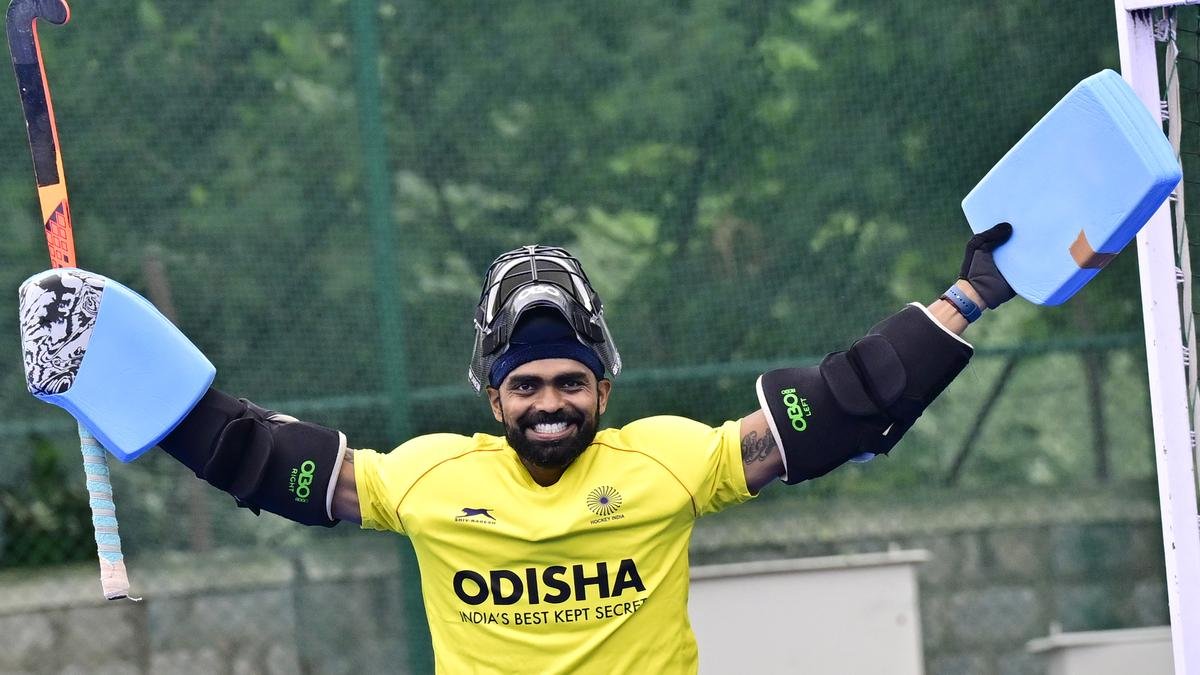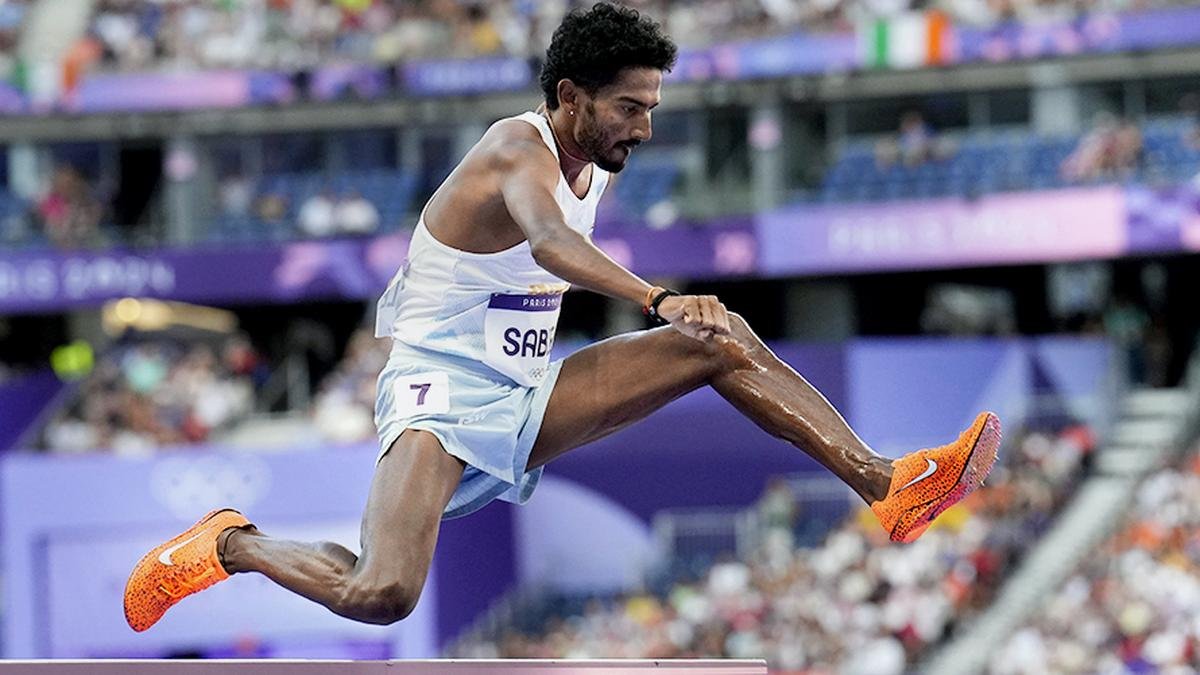In Bengaluru, a wall in the modest lobby of the Sports Authority of India (SAI) hostel, which houses the Indian hockey team, is adorned with a picture of a smiling P.R. Sreejesh, proudly wearing the 2020 Tokyo Olympics bronze medal that the country won after a patient wait of 41 years.
Sreejesh, who is nearing the rare milestone of playing in his fourth Olympics along with teammate Manpreet Singh, sits with Sportstar after a two-hour training session. Leslie Claudius, Udham Singh and Dhanraj Pillay, none of whom were goalkeepers, are the only other Indians to have achieved this feat.
‘”It’s really exciting because very few have achieved this for India. You feel more responsible when you are participating in your fourth Olympics. The previous one was much better than all the other editions. So, this time it’s about being more responsible,” Sreejesh says. “For me, it’s about giving my best performance and supporting my team. It’s a privilege to compete at the 1924 Paris Olympics stadium, which will host hockey.”
In his two-decade-long career, Sreejesh has experienced more downs than ups, which has made him truly appreciate the value of the Tokyo medal. Sreejesh acknowledges that the Olympics bring pressure, which is inevitable for a team that won the bronze medal last time.
“Every time we have participated, we have hoped for a medal, and we finally got it last time. This time, we believe that we are capable of achieving it once again. All 11 players on this team understand how difficult it was to succeed last time.
“The expectations are because of our performance. I don’t think we should take expectations as pressure. We should consider it as support and use it as a 12th man.”
Comparing the Tokyo and Paris journeys, Sreejesh offers an honest perspective.
“The Tokyo team was totally different because the COVID lockdown –gave us space and time to bond with and understand each other; that team was built differently. We were isolated on the whole campus. I would sit in my room and wave at everyone. That’s how we used to communicate. We even conducted training sessions on Zoom. That helped us achieve a unique bond, different from the present team.
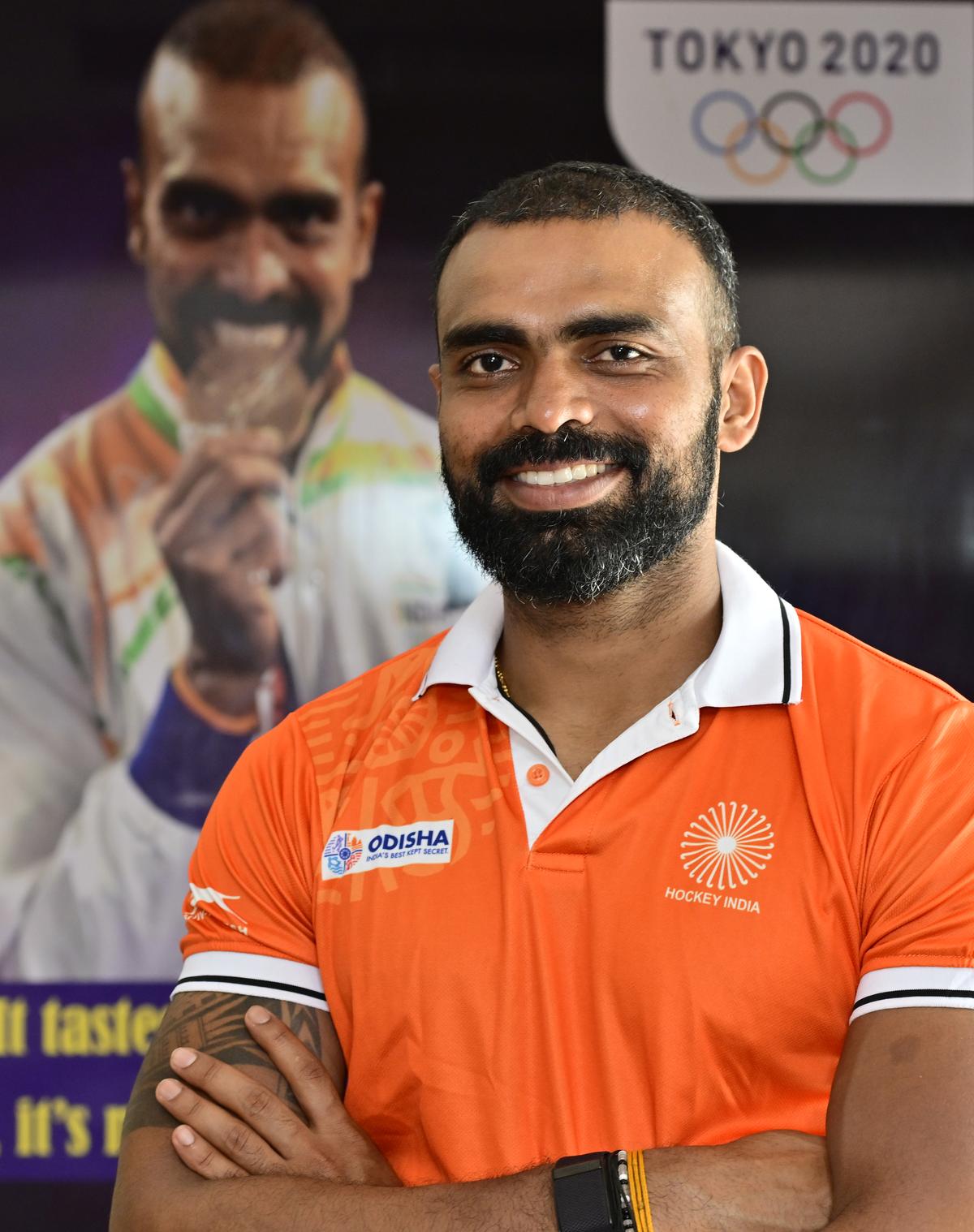
Mentor mode: Sreejesh says he always tries to push himself by self-learning, self-correction, teaching the youngsters and guiding them.
| Photo Credit:
K. Murali Kumar
Mentor mode: Sreejesh says he always tries to push himself by self-learning, self-correction, teaching the youngsters and guiding them.
| Photo Credit:
K. Murali Kumar
“But be it time, facilities or tactics — everything changes. Now, we have five or six new players in the team and a new coaching staff. Everything will be totally different from Tokyo. But I believe that at present, this is the best team to represent India in the Olympics.”
For Sreejesh, Tokyo is now history. “We cannot dwell on it now. Every team is improving a lot, and playing really well. The top six of them are very competitive and capable of beating each other on any given day. This is going to be tough for us. But I think we are capable.”
Keeping his place in the team is challenging for the 36-year-old with younger goalkeepers vying for the position. The experienced custodian is a colleague, competitor, and mentor all rolled into one for 27-year-old Krishan Pathak and 28-year-old Suraj Karkera.
“You need to be physically and mentally fit to compete with them,” he says.
But taking the youngsters along is crucial. “There shouldn’t be a gap between me and them. I try to keep it open for everyone, talk to everyone, make fun of them, advise them, guide them, correct them, and go eat with them.”
“If you feel like you are the senior guy and they should come to you, that is not the way a team works.”
But Sreejesh wants Pathak and Karkera to earn their spots. “Suraj and Pathak have been with me since 2016. After the Junior World Cup, they joined us and have been working alongside me. The Indian national hockey team has an open plate. If you are good, you are in. If not, there is no place for you. I always try to improve myself to earn my place and work hard alongside them.
“When the team was announced, I felt bad because these two guys were always travelling with me. When it comes to the Olympics, there is only one goalkeeper. It’s a bit awkward. You should ask yourself, ‘Why am I here?’ Because I want to play in the Olympics. Otherwise, I could have ended my career three years ago.”
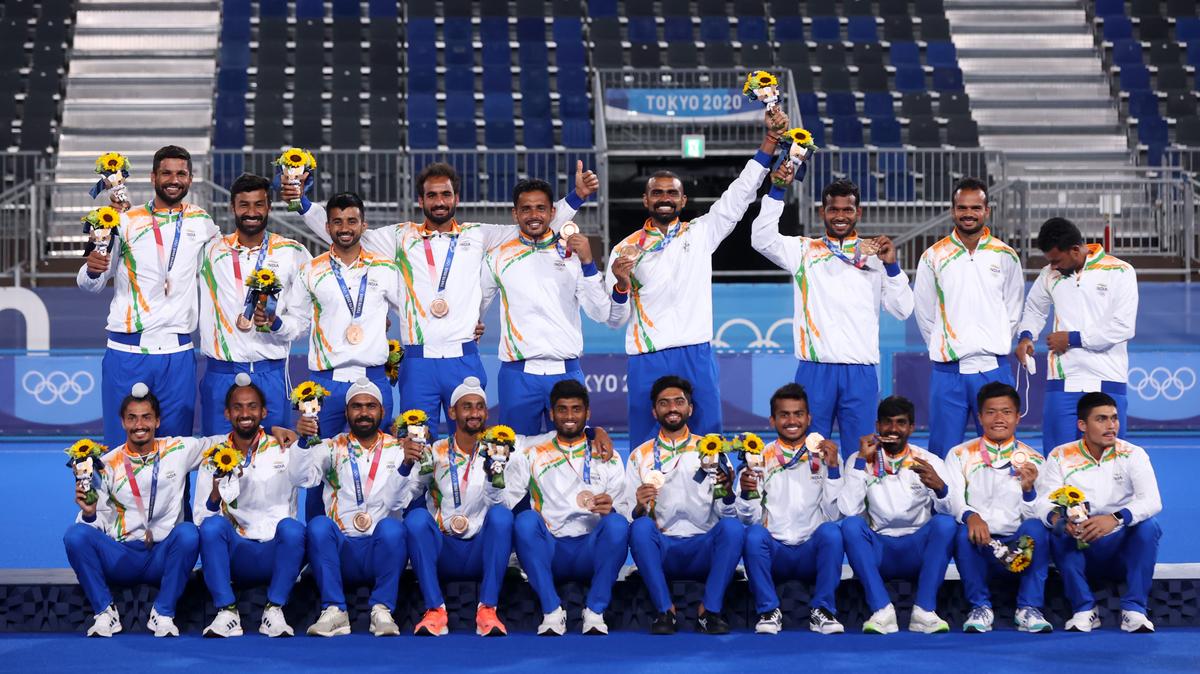
One for the album: The Indian hockey players pose with their bronze medals at the Tokyo Olympics. India beat Germany 5-4 in the third-place match to clinch a historic victory. Below: An ecstatic Sreejsh celebrates the win.
| Photo Credit:
Getty Images
One for the album: The Indian hockey players pose with their bronze medals at the Tokyo Olympics. India beat Germany 5-4 in the third-place match to clinch a historic victory. Below: An ecstatic Sreejsh celebrates the win.
| Photo Credit:
Getty Images
His competitive nature and pursuit of excellence have enabled Sreejesh to develop as a goalkeeper and remain significant over time. His position has also contributed to his longevity.
“There are times when we just copy what our previous goalkeepers or coaches taught us. We never learnt anything from other goalkeepers — from the Europeans or other international players. The techniques we learnt were wrong. After the 2012 Olympics, I changed my basics.
“That was the toughest period for me because every time I did something, the goalkeeping coach from South Africa, Dave Staniforth, would say, ‘Sree, you can’t keep your hands like that, or you can’t keep them like this. You have to be like this, you have to be on your toes, you can’t move around, you have to stay focused.’ I never had that kind of training before. I had coaches who taught me, but it was not clear.
“From there, I tried to teach myself what was right for me. I tried to update myself. Every time I did something wrong, I corrected myself. When I became a senior on my team, I guided my juniors as well. It was like a give-and-take policy. You train them; you correct them. Automatically, you learn. That helps you to self-improve.
“The second thing is challenging yourself. After 2012, when Bharat Chetri left the team, I got the opportunity to be the number one goalkeeper, which can feel like a comfort zone. But I never allowed myself to stay there. I always try to push myself by self-learning, self-correction, teaching the youngsters and guiding them.
“It’s helped me improve every time. When I concede a goal, I watch the videos to better understand why and how I conceded it, and what I could have done to save it.”
Sreejesh, who played a critical role in making some valuable saves in the Tokyo Games, spoke about former Dutch keeper Jaap Stockmann’s assistance during the tournament.
“Jaap was like a shadow with me. Every time I texted him, he would text me back. He watched the matches but never tried to change my basics.
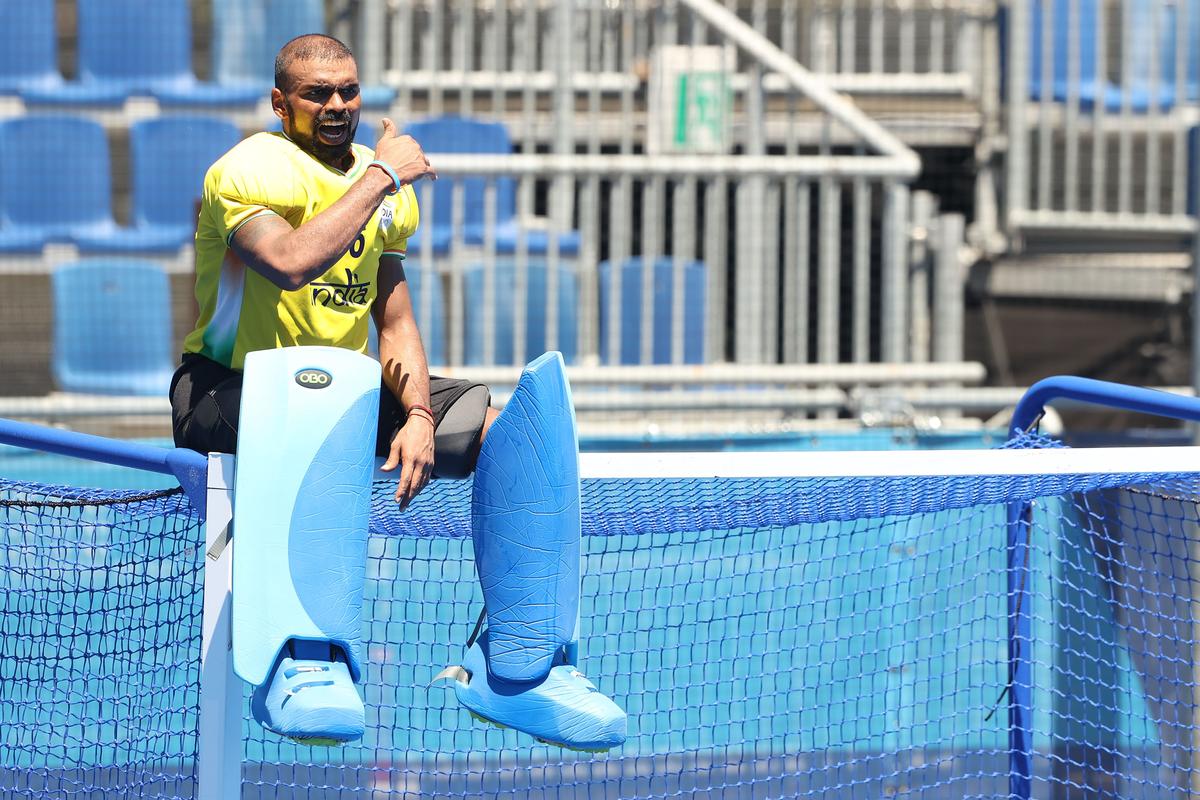
Sreejesh created that iconic moment in Tokyo by sitting atop the goalpost after India defeated Germany, ensuring a historic podium finish. Now, he is again ready to give his best in Paris and help India finish in the medal brackets.
| Photo Credit:
Getty Images
Sreejesh created that iconic moment in Tokyo by sitting atop the goalpost after India defeated Germany, ensuring a historic podium finish. Now, he is again ready to give his best in Paris and help India finish in the medal brackets.
| Photo Credit:
Getty Images
“He always tried to help me with my mentality — like how to approach the quarterfinals and semifinals, how calm I should be, and how to do things better.
“Goalkeeping is all about learning, relearning, and working hard. That’s the only thing that keeps you at the top of your game. I believe that it always gets better after the age of 25–28. Once you play 100 matches, you get that rhythm.
“I always say goalkeepers are like wine. If you keep it over a period, it tastes better.”
With the sport becoming faster and strikers finding new ways to beat defences, Sreejesh makes himself better equipped to safeguard the goal.
“Firstly, you train with the best forwards. They always try to do a lot of variations, hitting as hard as they can. Secondly, you sharpen your defenders. Someone like Harmanpreet is always there to support me. With techniques changing and the game getting faster, these guys are getting sharper. And it’s not ‘me’, it’s ‘us’. It’s the defenders, starting from the forward line. For that, we need to do a lot of reflex workouts and short exercises, which can help us move faster. Then, definitely, I lift a lot of weights in the gym.”
For all the toil done over the years, Sreejesh had to sacrifice a lot. But he feels it is worth it. “Whatever sacrifices I have made, I am so happy about them. Because my kids are really proud of who I am and what I am doing for my country. And they realise it.”
Sreejesh, looking as sharp as ever, is one of the most recognisable faces. He created that iconic moment in Tokyo by sitting atop the goalpost after India defeated Germany, ensuring a historic podium finish. Now, he is again ready to give his best in Paris and help India finish in the medal brackets.

